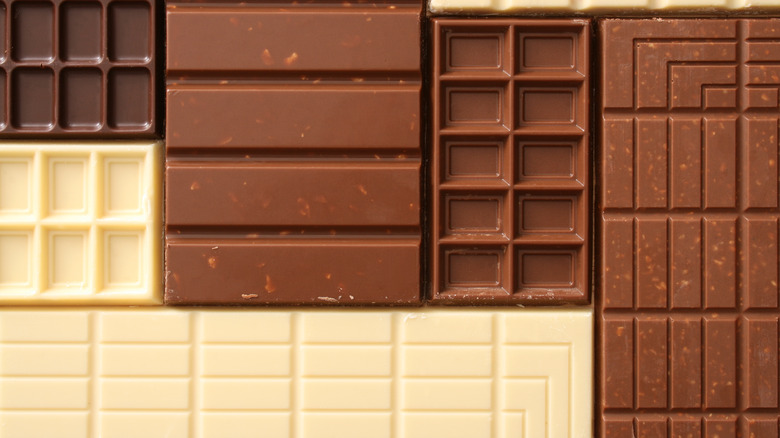The Simple Storage Tip For Keeping Chocolate Fresh
For some especially dedicated chocolate lovers, it might be hard to hold on to the bars of chocolate sitting in the pantry. They're just here one day and gone the next. But if you're storing some baking chocolate so it's always there for your next chocolate baking project, there are a few things you should know about how to store it to keep it fresh.
Contrary to popular belief, storing chocolate is not as simple as putting it on a shelf and closing the cupboard. All chocolate is made up of very delicate elements. One important thing to remember about this treat is that chocolate readily takes on flavors derived from scents, so it can start to taste like the things it's stored next to in your cupboard. Because of that, it's important to store your baking chocolate far away from foods with strong smells. This means you should not let foods like onions or garlic sit near your chocolate. Instead, store your chocolate separately from all other foods.
If you haven't heard about chocolate's strong binding powers before, you're not alone. Let's dig into the science behind this phenomenon.
How chocolate absorbs strong smells
Chocolate has a lot of different components that contribute to its unique smell, we're talking thousands of unique molecules. Still, you can trace the majority of its scent and taste to roughly 25 essential molecules. The concentrations of each of these compounds have to be exact in order to give off the chocolate taste we are familiar with. If any of them are off, your chocolate can end up tasting like something completely different. For example, chocolate has a very similar molecular makeup to peanuts, so if the ratios are off, you might feel like you're biting into a bar of peanut butter. This balance can easily be thrown off if the chocolate interacts with an unknown substance, like other molecules from a strong nearby odor.
To help safeguard against other smells binding with the bar, you can wrap the bar in plastic wrap or another barrier such as an airtight container. And if you're still getting weird tastes or smells from your chocolate, it might be another storage problem that you haven't thought of.
Other chocolate storing tips to keep in mind
While keeping your chocolate away from strong smells and tastes is important, it isn't the only chocolate storage tip you need to know. Other important factors that could affect your chocolate are temperature and humidity.
While some might opt to store chocolate in the fridge, this method is not ideal. The cool temperature plus the humidity of fridges makes chocolate sweat and achieve an undesirable texture. It's best you leave your baking chocolate in a cool, dry place like a pantry instead. Temperatures that are too hot can lead to melted chocolate, while cold temperatures can make your chocolate become brittle and cracked.
Baking chocolate does not typically have an expiration date because, like honey, it does not contain water. Still, that does not mean it's invincible. Changes in temperature, like if your chocolate was stored in a too-warm place and then cooled off, can lead to blooming, which makes the chocolate appear chalky on the outside — though still fine to eat or bake with, the flavor won't be its best. So keep in mind that storing chocolate is not as simple as it seems, and don't keep a bar exposed in your pantry for too long. You don't want your chocolate zucchini bread to start tasting like your spice rack.


